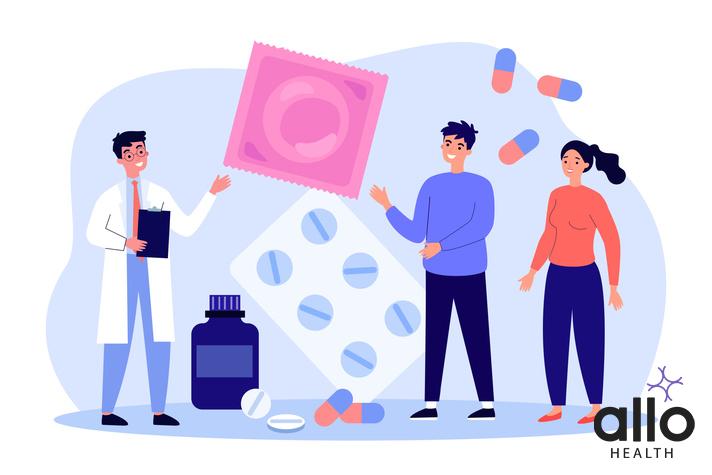Erectile Dysfunction Symptoms

Allo Health is dedicated to personalized well-being, offering support and trusted information tailored to individual health goals. The platform emphasizes human-generated content, led by a distinguished medical team of experts, including physicians and sexual health specialists. Their commitment to credibility involves rigorous fact-checking, authoritative research, and continuous updates to ensure accurate, up-to-date information. Allo Health's unique approach goes beyond conventional platforms, providing expert-led insights and a continuous commitment to excellence, with user feedback playing a crucial role in shaping the platform's authoritative voice.

A Psychotherapist with Clinical specialization, working for over seven years now. Areas of specialization range from Anxiety-related disorders, Mood-related disorders, Personality disorders, Sexual dysfunctions & other mental health issues.
Why This Was Upated?
Our experts continually monitor the health and wellness space, and we update our articles when new information became available.
Updated on 20 May, 2024
- Article was updated as part of our commitment to diversity, equity, and inclusion.

"The following blog article provides general information and insights on various topics. However, it is important to note that the information presented is not intended as professional advice in any specific field or area. The content of this blog is for general educational and informational purposes only.
Book consultation
The content should not be interpreted as endorsement, recommendation, or guarantee of any product, service, or information mentioned. Readers are solely responsible for the decisions and actions they take based on the information provided in this blog. It is essential to exercise individual judgment, critical thinking, and personal responsibility when applying or implementing any information or suggestions discussed in the blog."
The symptom of erectile dysfunction, a common sexual disorder, is broadly one – the inability to achieve or maintain an erection hard or sufficient enough for sexual intercourse. However, erectile dysfunction not only has many causes that can lead to it, but can also have consequences if not diagnosed or left untreated.
What are the Symptoms of Erectile Dysfunction?
The symptoms of erectile dysfunction include:
1. Difficulty in getting an erection
This refers to the challenge a person may face when trying to achieve an erection. It means that despite sexual arousal or stimulation, the penis may not become sufficiently firm for sexual activity.
2. Difficulty in maintaining an erection
This occurs when a person is able to achieve an erection initially, but struggles to keep it firm and sustained during sexual activity. This can lead to frustration and hinder a satisfying sexual experience
3. Getting a partial erection, not firm/hard enough for vaginal penetration
In this situation, a person may experience an erection, but it’s not sufficiently rigid for successful vaginal penetration. This can be frustrating and may lead to feelings of inadequacy.
4. Reduced libido or sexual desire
This pertains to a decrease in the level of sexual desire or interest in engaging in sexual activities. It’s characterised by a reduced inclination or motivation for sexual intimacy.
5. Performance anxiety
This is a psychological condition where an individual becomes overly anxious or stressed about their sexual performance. It can lead to a self-fulfilling prophecy where anxiety itself hinders sexual performance.
6. Increased anxiety and stress associated with sexual intercourse
This refers to the heightened levels of anxiety and stress a person experiences specifically related to sexual intercourse. It can be triggered by concerns about performance, fear of failure, or worries about satisfying a partner.
7. Reduced quality of life
Erectile difficulties can significantly impact an individual’s overall quality of life. It may lead to feelings of frustration, embarrassment, and a sense of dissatisfaction in intimate relationships, which can extend to other aspects of life.
8. Interpersonal or relationship issues
Erectile dysfunction can strain relationships. It may lead to communication challenges, emotional distance, and feelings of frustration or inadequacy for both partners. Addressing these concerns together is crucial for maintaining a healthy and satisfying relationship.

Treating Erectile Dysfunction
Treatment is relative to the determined cause behind erectile dysfunction symptoms. Some common treatments for erectile dysfunction include:
1. Medicative intervention or oral medications: PDE-5 inhibitors or SSRIs:
- PDE5 Inhibitors: These are prescription drugs designed to improve blood flow to the penis. They work by inhibiting the enzyme PDE-5, which can lead to improved erections. Common examples include Viagra, Cialis, and Levitra.
- SSRIs (Selective Serotonin Reuptake Inhibitors): While primarily known as antidepressants, some SSRIs can also be used to treat premature ejaculation. They work by affecting serotonin levels in the brain, which can help delay ejaculation.
- Medical devices like vacuum pumps (vacuum erection devices) can also help with erection
2. Psychological counselling and sex therapy:
- Psychological Counselling: This involves speaking with a mental health professional who specialises in sexual health. It can address underlying psychological factors contributing to ED or other sexual concerns.
- Sex Therapy: Sex therapists are trained to help individuals and couples address various sexual concerns, including ED. They use a combination of talk therapy, education, and exercises to improve sexual functioning and satisfaction.
3. Treating and managing chronic health conditions and mental health concerns:
Managing chronic health conditions like diabetes, heart disease, or high blood pressure is crucial, as these can contribute to ED. Controlling these conditions through medication, lifestyle changes, and regular medical check-ups is vital. Additionally, addressing mental health concerns like anxiety or depression can also positively impact sexual function.
4. Updating prescription medications that may be causing Erectile Dysfunction symptoms:
Some medications used to treat other health conditions can have side effects that contribute to ED. In such cases, consulting with a healthcare provider to explore alternative medications or dosages is important.
5. Medication condition treatments such as chemotherapy or radiation therapy:
Some medical conditions, such as cancer, may require treatments like chemotherapy or radiation therapy. These treatments can have side effects, including sexual dysfunction. In such cases, discussing potential sexual health concerns with a healthcare provider is crucial. They can provide information on managing these effects and potential solutions.
6. Modifying lifestyle factors to lower the risk of erectile dysfunction:
Lifestyle changes can play a significant role in reducing the risk of developing ED. This may include regular exercise, maintaining a balanced diet, avoiding excessive alcohol consumption, quitting smoking, and managing stress. These changes can improve overall cardiovascular health, which is closely linked to erectile function.
A physical exam is not always required for diagnosing erectile dysfunction, however, medical treatment is imperative. Erectile dysfunction symptoms can be an indicator of heart disease or other heart conditions. It’s important to have an accurate diagnosis before initiating any treatment plan with your healthcare provider.

Causes of Erectile Dysfunction
Any medical condition or situation that affects the blood vessels or blood flow or blood circulation in the penile arteries, and mental health concerns can all lead to symptoms of erectile dysfunction. Conditions like cardiovascular disease, diabetes, or high blood pressure are all potential underlying factors that can contribute to erectile dysfunction symptoms.
For this reason, medical history, sexual history taking, diagnostic testing (such as blood tests and lipid profiles) allows for medical professionals to assess a patient’s health holistically before determining the exact cause(s) of their erectile dysfunction symptoms.
Overview of all the potential causes of erectile dysfunction:
- Underlying conditions such as diabetes, high cholesterol, hypertension, heart conditions, kidney disease
- Surgeries such as vascular surgery or prostate surgery
- Psychological conditions such as depression, anxiety
- Hormone levels fluctuation such as low testosterone levels
- Physical injury to the pelvic area or any pelvic nerve damage or nerve function
- Sexual addictions such as porn and masturbation addiction
- Recreational drugs or illegal drugs addiction such as cannabis
- Lack of physical activity or exercise
- Lack of a healthy and nutritious diet
- Genetic conditions such as heart attacks
Key Takeaways
- Erectile Dysfunction Symptoms: Difficulty achieving/maintaining erection, partial erection, reduced desire, performance anxiety, heightened intercourse-related stress, diminished quality of life, relationship challenges.
- Treatments: Medications (PDE-5 Inhibitors, SSRIs), counselling/sex therapy, managing health conditions, adjusting medications, addressing side effects of treatments, lifestyle changes.
- Diagnosis: Physical exam not always required but accurate diagnosis crucial for effective treatment.
- Causes: Medical conditions, surgeries, psychological factors, hormonal imbalances, physical trauma, sexual addictions, substance abuse, sedentary lifestyle/poor diet, genetic predispositions.
Frequently Asked Questions
Q: Can low sexual desire be a erectile dysfunction symptom?
A: Yes, low sexual desire can be a symptom of ED – this is because due to the psychological and physical toll ED symptoms can cause. However, the cause behind the erectile dysfunction symptoms – such a chronic medical conditions – can also be the cause of low sexual desire. Erectile dysfunction symptoms are evaluated are by healthcare professional so effective treatment can be prescribed.
Q: Can erectile dysfunction lead to hair loss?
A: No, there is no evidence that Erectile Dysfunction can lead to hair loss.
Q: Can erectile dysfunction symptoms last forever?
A: In most cases, the symptoms of erectile dysfunction are temporary, if holistically treated. Untreated erectile dysfunction can lead to symptoms being experienced by an individual for a long time. However, treatment can help relive Erectile Dysfunction symptoms in about 6-8 weeks.
Q: Can erectile dysfunction be painful?
A: No, erectile dysfunction symptoms should not be painful. If you have an erection that is painful or that your penis hurt, we encourage you to speak to a professional as soon as possible.
Q: What blood test shows erectile dysfunction?
A: There are no blood tests that determine erectile dysfunction, however, they are used for diagnostic testing in order to determine the cause and/or rule out any chronic medical conditions. Blood tests can help determine the physical condition of the body which would aid in treatment options or type of treatment to improve sexual function – such as levels of testosterone, or blood sugar. The risk factors associated with ED are also carefully examined.
Q: What is the biggest reason for erectile dysfunction?
A: There are a variety of factors that can lead to sexual dysfunction. Physical causes of erectile dysfunction are the most common – these can include heart disease, hypertension, diabetes, obesity, smoking, drinking etc. Psychological conditions or emotional factors, such as depression, anxieties, stress, relationship problems, and other mental health concerns can also interfere with sexual feelings.
Q: How do you confirm you have erectile dysfunction?
A: A medical health professional will be able to diagnose erectile dysfunction only after understanding the health history of their patient. This would include taking medical and sexual history to learn about any underlying health conditions, prescribing diagnostic texts, and prescribing any imaging that may be required.







































